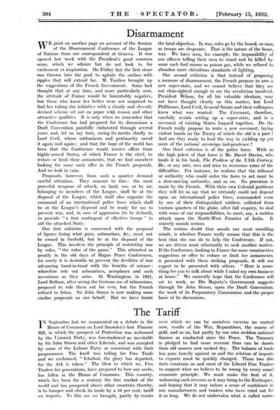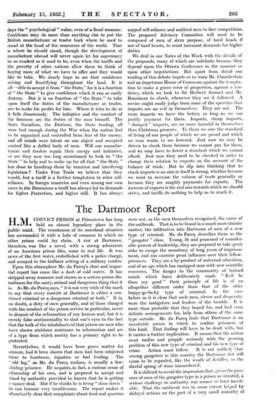The Tariff
TN September last we commented on a debate in the -I- House of Commons on Lord Snowden's last Finance Bill, in which the prospect of Protection was welcomed by the Unionist Party, was foreshadowed as inevitable by Sir John Simon and other Liberals, and was accepted by some of the Labour Party as consistent with their ' programmes. The knell was tolling for Free Trade and we exclaimed, " Ichabod, the glory has departed, for the Ark is taken." The blow to which we, Free Traders for generations, have prepared to bow our necks, has fallen in the House of Commons. This country, which has been for a century the free market of the world and has prospered above other countries thereby, is to hamper and check its trade by a 10 per cent. tariff on imports. To this are we brought, partly by events over which we can by ourselves exercise no control now, results of the War, Reparations, the course of gold, and so on, but partly by our own reckless national finance as conducted since the Peace. The Treasury . is pledged to find more revenue than can be drawn from old sources now sucked dry.• The balance of trade has gone heavily against us and the relation of imports to exports must be quickly changed. Those two dire facts constrain us and most of the Liberal Free Traders to support what we believe to be wrong by every sound economic principle. We must make the best of it, welcoming such revenue as it may bring to the Exchequer, and hoping that it may induce a sense of confidence in our manufacturers and traders who have cried out, for it so long. We do not_ undervalue what is called nowa-
days the " psychological " value, even of a fiscal measure. Confidence may do more than anything else to put the British manufacturer or trader back where he used to stand at the head of the commerce of the world. That is where he should stand, though the development of manufacture abroad will never again let his supremacy be so marked as it used to be, even when the tariffs and the poverty of other .nations allow them to think of buying more of what we have to offer and they would like to take. We dearly hope to see that confidence arising and fructifying throughout the land. It is alle —able to accept it from" the State," for it is a function of " the State " to give confidence which it can so easily destroy. But it is no function of " the State " to take upon itself the duties of the manufacturer or trader, nor to make his profits for him. Where it tries to do so it fails disastrously. The initiative and the conduct of the business are the duties of the man himself. The State Socialism, the Etatisme, the State trading, all were bad enough during the War when the nation had to be organized and controlled from fear of the enemy, and all minds were intent on-one object and accepted control like a- drilled body of men. Will our manufac- turers and traders regain their energy and initiative, or are they now too long accustomed to look to " the State " to help and to make up for all that " the State " has'done -to handicap them by taxation and interfering legislation ? Under Free Trade we believe that they would, but a tariff is a further temptation to relax self- reliance. In foreign countries and even among our own races in the Dominions a tariff has always led to demands for higher Protection, and higher still. It has always
sapped self-reliance and unfitted men to face competition. The proposed Advisory Committee will need to be composed of men of stern purpose, of hard heads if not of hard hearts, to resist incessant demands for higher duties.
We deal in our Notes of the Week with the details of the proposals, many of which are indefinite because they depend upon the Ottawa Conference in the summer or upon other negotiations. But apart from detail our reading of this debate impels us to warn Mr. Chamberlain and an impetuous House of Commons against the tempta- tion to make a grave error of proportion, against a ten- dency, which we look to Sir Herbert Samuel and Mr. Runciman to check, whenever they see it followed. A novice might easily judge from some of the speeches that imports arc an evil in themselves. They are not. The more imports we have the better, so long as we can justify payment for . them. Imports, cheap imports, " dumped " imports, are no more harmful in themselves than Christmas presents. To them we owe the standard of living of our people of which we are proud and which no man wants to see lowered. Just now we may be driven to check them because we cannot pay for them, and we may have to lower a standard which we cannot afford. Just now they need to be checked in order to change their relation to exports on the account of the balance of trade. But to slip into thinking that to cheek imports is an aim in itself is wrong, whether because we want to increase the volume of trade generally or because they are roughly payments for exports. The increase of exports is the real aim towards which we should strive, and tariffs do nothing to help us to reach it.







































 Previous page
Previous page